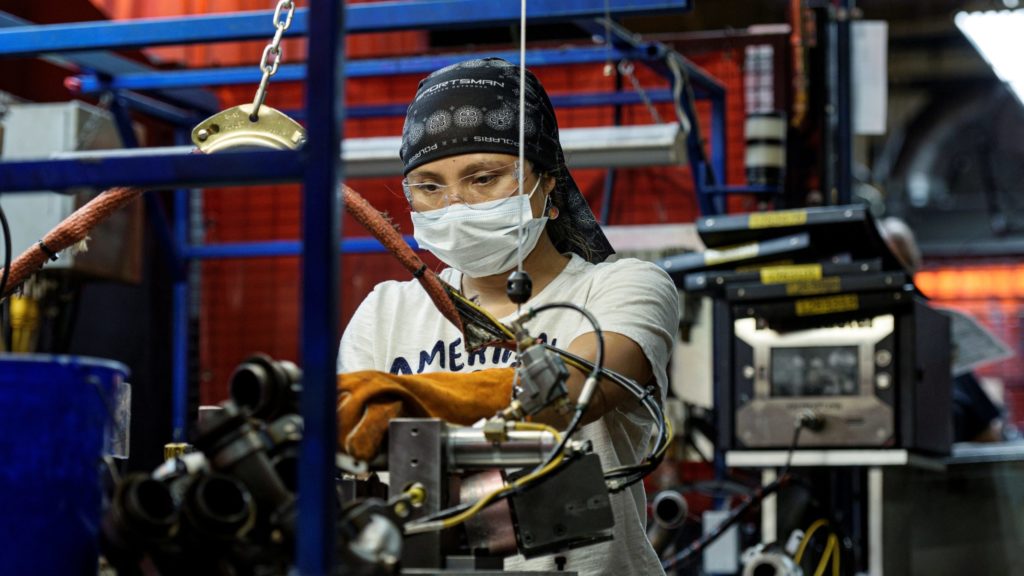What began in 1882 in New York City, Labor Day was created to recognize the contributions of American workers. That purpose still holds true today, but this year, the American bishops are also using the holiday to highlight the hardships many workers face.
“Dignified work reflects that our humanity gives us an active role to play in cultivating a world around us,” said Bishop Mark Seitz of El Paso and Archbishop Borys Gudziak of the Archeparchy of Philadelphia. “Through work, we exercise dominion over how we provide the material needs for ourselves and our families. God desires for us to do more than simply survive but to thrive.”
“Yet, in today’s economy, too many people and families are living in poverty due to jobs with low pay that often provide little or no benefits, erratic work schedules, and offer insufficient protections,” Seitz and Gudziak said. “At the same time, union representation has diminished, especially in the private sector, leaving workers with less protection and a weakened bargaining position.”
“We know it does not have to be this way,” the prelates added.
Seitz and Gudziak, chairmen of the U.S. Bishops’ Conference Committees on Migration and Domestic Justice and Human Development, respectively, issued the statement on Aug. 28 in advance of Labor Day on Sept. 2. A national holiday since 1894, Labor Day is celebrated annually on the first Monday in September.
Seitz and Gudziak called on society this Labor Day to recommit to building a society that honors human dignity, noting that the Catholic faith advocates for protections that allow laborers to thrive. Specifically, they highlight the plight of immigrant and child laborers.
On immigrants, Seitz and Gudziak note that immigrant workers – who many communities and sectors turn to amid labor shortages – have a positive impact on the economy, but are still mistreated at a higher rate than their native-born counterparts. They cite human trafficking as a major issue that is still prevalent, as well as general hostility and discrimination.
A Congressional report published last September estimated that there are about 8.8 million illegal immigrants in the U.S. labor force. The top jobs they hold include as maids and housekeepers, cooks, construction workers, farmers, and landscapers, according to the report.
“The Church supports both workers and immigrants around the country, especially those who often work in agricultural and other industries without protections because of their immigration status,” Seitz and Gudziak said. “These workers contribute to the local economy, pay taxes, and own homes. Yet, they are often the victims of wage theft and legitimately fear reprisal if they speak up about missing wages or unjust practices.”
Seitz and Gudziak blamed the lack of changes to the nation’s immigration system for some of the problems that exist, arguing that the current system “does not adequately address the needs of American families, employers, communities, or immigrants.”
“These shortcomings, when coupled with the issue of labor shortages, have increased opportunities for the exploitation of immigrants and led some to resort to using children as a supplemental source of labor,” Seitz and Gudziak said. “We have witnessed concerning affronts to the dignity of children, native-born and immigrant alike, whose innocence has been traded for cheap – and often dangerous – labor.”
The latest government statistics confirm that child labor and child labor violations have increased in recent years. U.S. Department of Labor data from Fiscal Year 2023 – Oct. 1, 2022-Sept. 30, 2023 – show that there were 955 cases with child labor violations, 5,792 minors employed in violation, and $8,039,728 issued in child labor civil money penalties.
Those figures are all the highest over the last decade – as far back as the data is shown. Comparatively, in Fiscal Year 2022, the data shows that there were 835 cases with child labor violations, 3,876 minors employed in violation, and $4,386,205 issued in child labor civil money penalties.
“With the number of child labor law violations having risen dramatically in recent years, several states have also taken steps to further weaken child labor standards, exposing young people to hazardous working conditions and long working hours,” Seitz and Gudziak said. “The children of families living in poverty stand to suffer the most harm, but the innocence and dignity of all youth must be protected.”
Seitz and Gudziak said immigration reform is essential, if not comprehensive then in small increments, as well as policies that “promote, preserve, and expand protections for all children.” They argue that it’s possible to create a thriving economy with dignified conditions for all workers.
“The Church offers a vision for the future that does not require our society to choose between a thriving economy, economic justice, dignified conditions for all workers, and safeguarding the most vulnerable among us,” Seitz and Gudziak said. “Catholics have consistently implored civil leaders to recognize and protect the sacredness of the human person. We must reject an economy of exclusion.”

